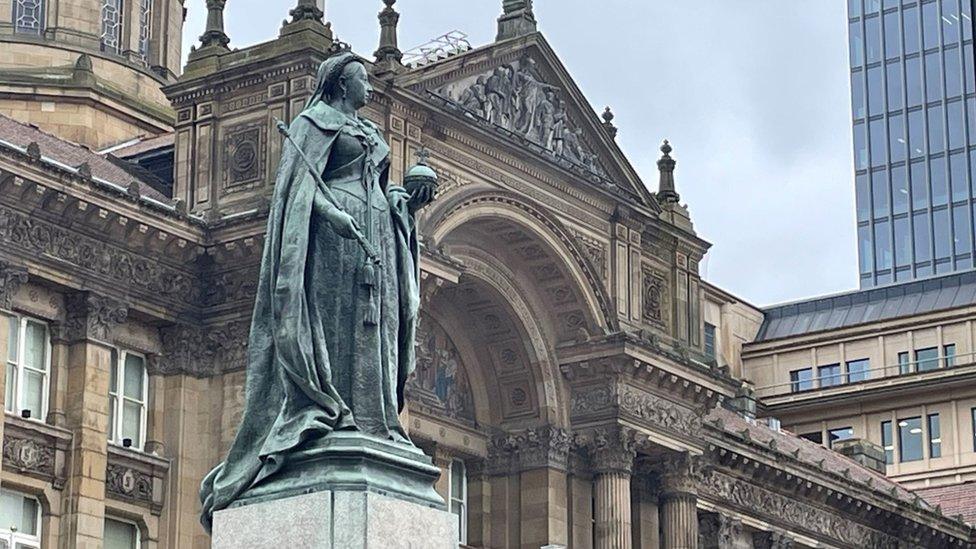Birmingham City Council signs off 'devastating' cuts
- Published
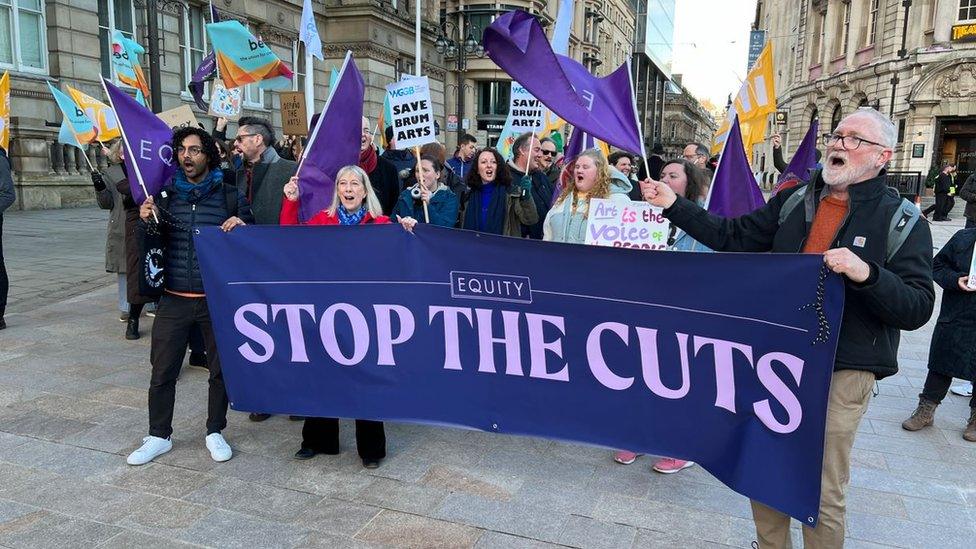
Protesters gathered outside Birmingham city council's chambers this afternoon
Birmingham City Council has signed off on a wave of cuts to services ahead of a 21% rise in council tax over two years.
The largest local authority in Europe declared itself effectively bankrupt and needs to make £300m in savings.
The financial measures have been described by those on the Labour-led council as "devastating".
Leader John Cotton apologised "unreservedly" to people living in the city during a full meeting on Tuesday.
Last September, the council said it could not afford to meet its financial obligations.
Facing an immediate budget shortfall of £87m, it was forced to issue a section 114 notice - effectively declaring itself bankrupt - after facing equal pay claims of up to £760m, and an £80m overspend on an under-fire IT system.
The cuts were first published in draft form in February, and touch on everything from reduced waste collections to dimmed street lighting.
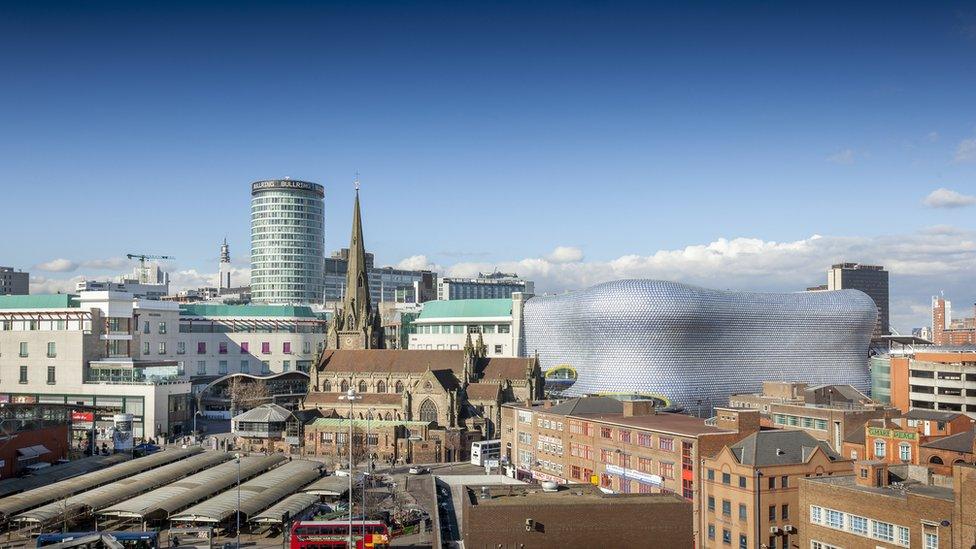
Residents will see a 10% increase in their council tax this April and a total rise of 21% by April next year
The crunch vote, in which 53 councillors voted for and 32 against, came hours before Jeremy Hunt was set to reveal his Budget.
In it, the chancellor is expected to ask councils to reduce spending on diversity schemes and consultants.
Local authorities across the country have said they are struggling to balance the books, with Nottingham also announcing big cuts to services.
'Unprecedented in scale'
Birmingham's Labour council leader Mr Cotton said the cuts were unprecedented in scale.
He blamed the government for causing wider financial issues at local council level.
"The mistakes made in Birmingham have not occurred in a vacuum and councils are facing a perfect storm of smaller budgets but higher costs," he said.
But local Conservative opposition leader Robert Alden accused city leaders of living in a fantasy land.
"It's a budget that shows just how badly Birmingham Labour have made a mess of the council's finances," he said.

No part of the council has been left untouched, with up to 600 council jobs potentially cut and libraries, parks and cultural projects all due to be affected.
Other dramatic measures include:
School transport for young people being placed under review
11 community centres being sold off
Reducing fly-tipping enforcement
Introducing parking charges in three country parks

About 200 protesters gathered outside the Council House to demonstrate against the proposals as the budget meeting took place.
Katie, who was motivated to join over cuts to arts and culture, said she believed the measures would have ramifications for decades.
"It's not our fault that any of this has happened, yet we're not going to have access to libraries [or] world class dance and music," she said.
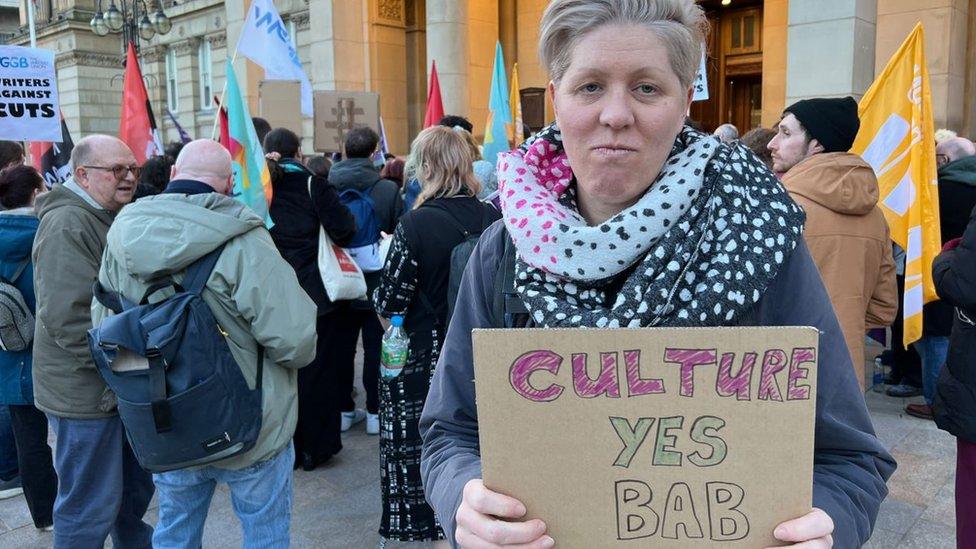
Katie was protesting against cuts to arts and culture
Residents in the city will see a 10% increase in their council tax this April and a total rise of 21% by April 2025.
The measure will bring in just £21.8m of additional council income in the 2024-25 financial year.
However, further financial challenges loom for Birmingham with an equal pay liability in excess of £867m, and an overspend on IT and finance system Oracle of about £136m.
A government bail-out loan of £1.25bn has been agreed to help the council deal with the issues but that will need to be repaid through the sale of assets.

Analysis: Simon Gilbert
BBC Political Reporter, Birmingham
Hundreds of protesters, five hours of councillor debate - but all ultimately in vain.
The cuts are coming and they are deep, all-encompassing and uncompromising.
Getting the public interested in local council finances is typically challenging.
Yet, wherever you go in Birmingham today, you are likely to find someone with a strong opinion on the council budget. That gives you an indication of just how sweeping these cuts are.
There is perhaps no area of the council, certainly no area of the city, that will not be impacted by these decisions.
One protester told me she was worried the cuts would have "ramifications for decades" on Brummies.
Looking closely at the figures, we see some of the biggest savings target services for children, young people and families. So it is easy to see why people are not just worried about pain today, but also the possibility of more pain tomorrow.

According to the Local Government Association, external, by the 2024-25 financial year councils will have seen a 27% fall in spending power on local services since 2010.

The City of Birmingham Symphony Orchestra is among arts organisations that have faced grant cuts
The reduction has been attributed to cuts in grants from central government, rising inflation, higher energy costs and increases to the National Living Wage.
Conservative West Midlands Mayor Andy Street has said the settlement the city council received from central government was large, partly to address 25% of households not paying full council tax.
According to the council, a quarter of Birmingham's 461,000 households are eligible for financial support, with 75,000 paying no council tax at all.
Mr Street said: "In recent years, the budget has been increased very substantially and if you look at cash invested by central government in the city's support services it actually gets one of the best settlements."
Ruth Millington, an art historian, critic and writer based in Birmingham has described recent news as terrible.
"At the heart of any great city is its culture," she said. "Protecting and promoting a creative economy is key for our city's recovery."

Follow BBC West Midlands on Facebook, external, X, external and Instagram, external. Send your story ideas to: newsonline.westmidlands@bbc.co.uk


Are you affected by the issues raised in this story? Share your experiences by emailing haveyoursay@bbc.co.uk, external.
Please include a contact number if you are willing to speak to a BBC journalist. You can also get in touch in the following ways:
WhatsApp: +44 7756 165803
Tweet: @BBC_HaveYourSay, external
Please read our terms & conditions and privacy policy
If you are reading this page and can't see the form you will need to visit the mobile version of the BBC website to submit your question or comment or you can email us at HaveYourSay@bbc.co.uk, external. Please include your name, age and location with any submission.
Related topics
- Published5 March 2024
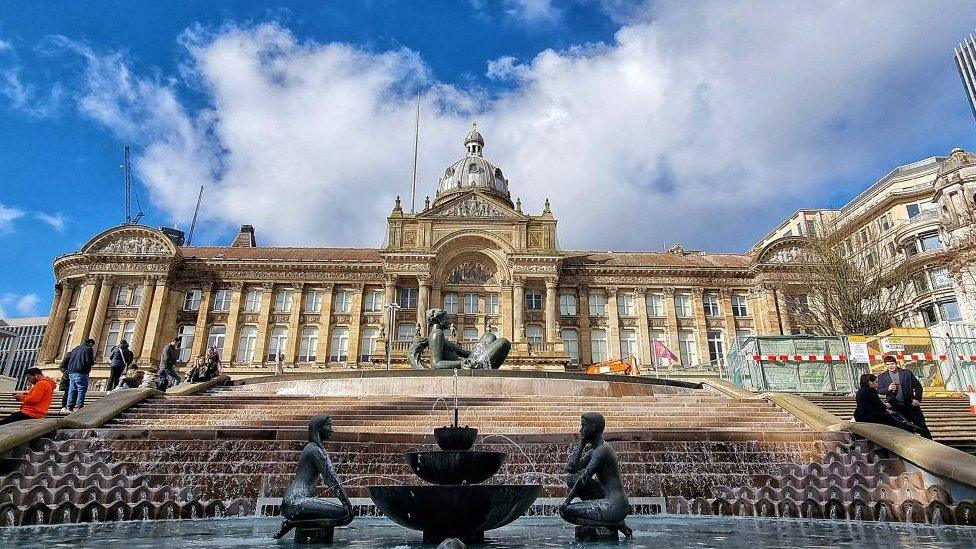
- Published21 February 2024
- Published19 February 2024
